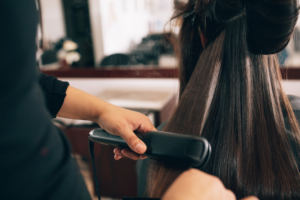 Dip dye hair colouring has been one of the most in-demand treatments at hair salons for over a decade now, with its popularity fuelled by social media exposure and numerous celebrities adopting the two-tone fading colour technique.
Dip dye hair colouring has been one of the most in-demand treatments at hair salons for over a decade now, with its popularity fuelled by social media exposure and numerous celebrities adopting the two-tone fading colour technique.
While dip dyeing is generally considered safe, the same level of skill and attention is required of hair stylists when mixing up dye products and applying them, including paying attention to how long they are left in the hair. Because dye is only applied to the tips of the hair and should not come into contact with the skin, no patch test is strictly necessary. However, the smallest error on the part of a stylist can mean that the dye comes into contact with the skin, with unpredictable consequences including the possibility of an allergic reaction.
Furthermore, dip dyes are often carried out before hair dye products containing para-phenylenediamine (PPD), a common trigger of allergic reactions, are applied to the main body of hair, and in such cases a patch test will always be necessary at least 48 hours prior to the treatment being carried out.
A hair dye patch test will therefore normally be advisable before a dip dye hair colouring treatment, and hair salons can be held legally responsible if they fail to carry out a patch test and a client subsequently experiences an adverse reaction to chemical ingredients contained in the dye solution.
Our female solicitors are experienced in claiming compensation for injuries caused by botched hair dyeing treatments, including allergic reactions to hair dye. Get in touch with our team for free legal advice that you can rely on:
https://www.bartletts.co.uk/our-services/personal-injury/allergic-reactions-to-hair-dye/
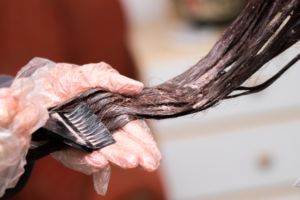 While hair dye products are not necessarily unsafe for the under 16s, children have much finer hair and greater sensitivity to chemicals than adults, which increases the likelihood of hair dye solutions damaging their hair. They are also more likely to develop allergies from exposure to these chemical ingredients which may affect their health in the future. All legal hair dye products used in the UK are labelled as “not intended for use on persons under the age of 16”, and any salon which offers hair dye treatments to clients under that age will not be covered by their insurance in the event of a procedure going wrong.
While hair dye products are not necessarily unsafe for the under 16s, children have much finer hair and greater sensitivity to chemicals than adults, which increases the likelihood of hair dye solutions damaging their hair. They are also more likely to develop allergies from exposure to these chemical ingredients which may affect their health in the future. All legal hair dye products used in the UK are labelled as “not intended for use on persons under the age of 16”, and any salon which offers hair dye treatments to clients under that age will not be covered by their insurance in the event of a procedure going wrong.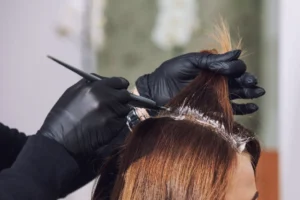 Many hair salons will currently be fully booked with hair colouring appointments in advance of the Platinum Jubilee and upcoming summer holidays. While safety standards at salons offering hair dyeing treatments have improved considerably since 2009, when an APIL survey found that the vast majority of salons were not carrying out patch tests to check for allergies, a significant number of women continue to experience allergic reactions to hair dye products during procedures every year, often with extremely painful and distressing consequences.
Many hair salons will currently be fully booked with hair colouring appointments in advance of the Platinum Jubilee and upcoming summer holidays. While safety standards at salons offering hair dyeing treatments have improved considerably since 2009, when an APIL survey found that the vast majority of salons were not carrying out patch tests to check for allergies, a significant number of women continue to experience allergic reactions to hair dye products during procedures every year, often with extremely painful and distressing consequences.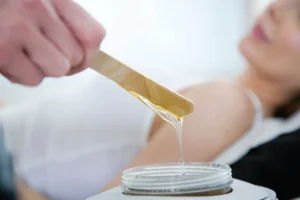 With millions of Britons booking long-awaited overseas beach holidays this year, as Covid restrictions on international travel finally ease, many women will be booking bikini and similar waxing treatments at their local beauty salon in order to look their best beside the sea and around the pool.
With millions of Britons booking long-awaited overseas beach holidays this year, as Covid restrictions on international travel finally ease, many women will be booking bikini and similar waxing treatments at their local beauty salon in order to look their best beside the sea and around the pool.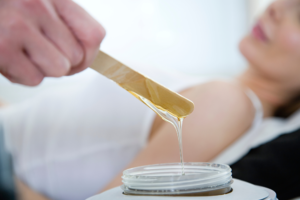 New Year’s Eve will bear a semblance of normality this year, in England at least, after the government gave mass events the go-ahead and nightclubs permission to open, in contrast with Scotland, Wales and Northern Ireland where restrictions on social gatherings and mass events are in place. Many women will be rushing to book last minute appointments at salons to look their best at parties and family gatherings, and as our solicitors have seen in previous years, an unfortunate number will have their big night ruined by botched hair and beauty treatments.
New Year’s Eve will bear a semblance of normality this year, in England at least, after the government gave mass events the go-ahead and nightclubs permission to open, in contrast with Scotland, Wales and Northern Ireland where restrictions on social gatherings and mass events are in place. Many women will be rushing to book last minute appointments at salons to look their best at parties and family gatherings, and as our solicitors have seen in previous years, an unfortunate number will have their big night ruined by botched hair and beauty treatments.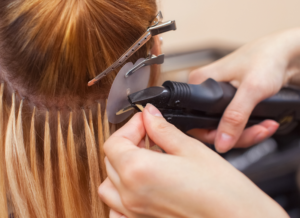 Quick weaves are a hairstyle that dates from shortly after the introduction of weaves in the 1950s. Tracks (wefts) of hair extension are glued to an easily applied and removed cap, which allows for an unlimited range of lengths, styles and colours. A quick weave takes roughly half the time of a full weave, and will generally last up to 4 weeks before needing to be removed.
Quick weaves are a hairstyle that dates from shortly after the introduction of weaves in the 1950s. Tracks (wefts) of hair extension are glued to an easily applied and removed cap, which allows for an unlimited range of lengths, styles and colours. A quick weave takes roughly half the time of a full weave, and will generally last up to 4 weeks before needing to be removed.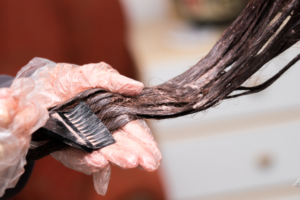 Various reports suggest that people are experiencing unexpected allergic reactions to hair dye after contracting Covid-19, indicating that the virus may be permanently changing the immune system of a minority and making them vulnerable to new allergies, including to hair dye products which they may have used for many years without any ill effect.
Various reports suggest that people are experiencing unexpected allergic reactions to hair dye after contracting Covid-19, indicating that the virus may be permanently changing the immune system of a minority and making them vulnerable to new allergies, including to hair dye products which they may have used for many years without any ill effect.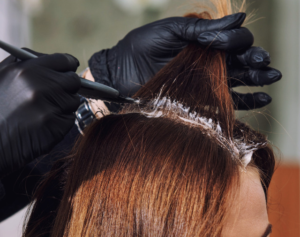 Following the reopening of hairdressers and barbers in Wales on Monday, March 15, customers in England are eagerly awaiting Monday, April 12, when hairdressing salons and barber shops are scheduled to reopen (along with all non-essential shops) in accordance with stage two of the government’s roadmap out of lockdown.
Following the reopening of hairdressers and barbers in Wales on Monday, March 15, customers in England are eagerly awaiting Monday, April 12, when hairdressing salons and barber shops are scheduled to reopen (along with all non-essential shops) in accordance with stage two of the government’s roadmap out of lockdown.